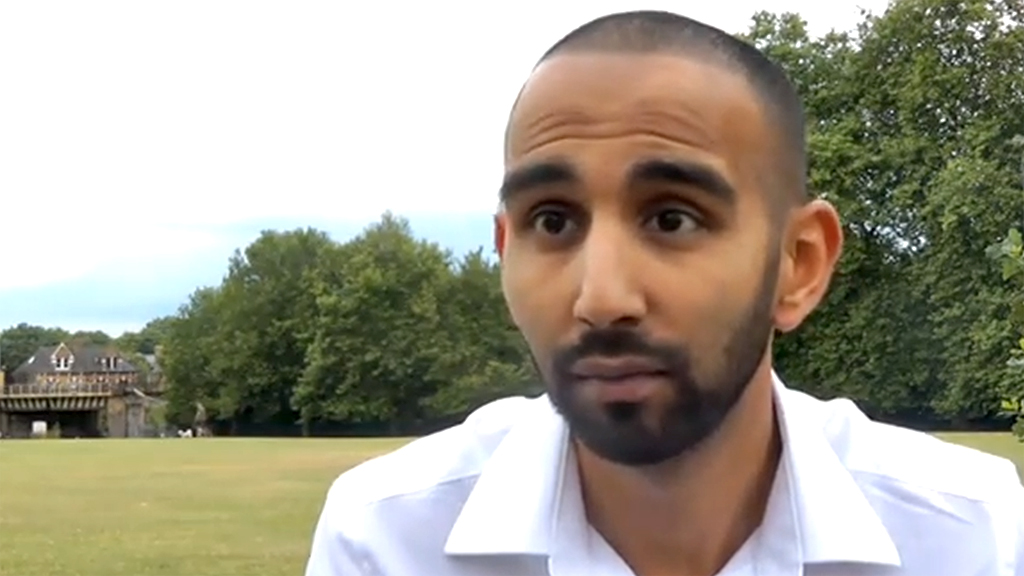‘Terror suspect’ wins payout from transport police
A 28-year-old man from London has won an undisclosed sum from two police forces for being detained unlawfully under terror laws after trying to make a complaint on a train.

The case has called into question how anti-terror legislation is being used while the government forces through emergency surveillance legislation to beef up state security against terrorism, writes Symeon Brown.
Taher Gulamhussein told Channel 4 News exclusively that when travelling from Kings Cross on 14 October 2010 for work, he was asked to provide a valid train ticket after being questioned by ticket inspectors.
When Mr Gulamhussein disputed the suggestion that his ticket was not valid – Mr Gulamhussein was later proven to be correct – his attempts to make a complaint and take a picture of the incident ended in him being detained and handcuffed by police officers.
Mr Gulamhusein was immediately released without charge on arrival at the station. However, a professional standards report found the legal volunteer was detained on suspicion of terrorist offences without sufficient grounds and that officers acted “incorrectly and unlawfully”.
Wider trend
The incident happened in 2010 but it has taken British Transport Police and a second force involved almost four years to reach a settlement.
A British Transport Police Spokesman told Channel 4 News: “Following a civil claim for damages into an incident that took place on a train on 14 October 2010, BTP has agreed to pay Mr Gulamhussein the sum of £3,000 in relation to his claim.”
The size of the settlement reached with the second police force has not been disclosed.
But the case appears to be part of a wider trend of terror legislation being used incorrectly.
With government set to increase surveillance powers, Mr Gulamhussein’s case raises questions on how the state uses the anti-terrorism powers it already has.
Mr Gulamhussein’s case raises questions on how the state uses the anti-terrorism powers it already has.
According to the most recent arrest figures published by the Home Office in June, of the 222 people arrested for terrorism-related offences, 24 per cent were charged for terror-related crimes.
However the UK’s largest police force, the Metropolitan Police – which may be most likely to encounter terror threats – had an arrest rate of just 7 per cent for stop and searches under section 43 of the terrorism act, with the number of terror-related charges likely to be significantly lower.
The figures have led to criticism that rather than being intelligence-led, current legislation is too broad, lacks clarity and is isolating the communities it should be engaging.
Lack of clarity
Commenting on Mr Gulamhussein’s case, the chair of the Islamic Human Rights Commission, Massoud Shadjareh, said that “the lack of clarity gives opportunity for racism and Islamophobia. If you give powers that aren’t clear how to be used they will be misused.”
However, Conservative MP Andrew Rosindell – a member of the all-party parliamentary group for tackling terrorism and MP for Romford, where Drummer Lee Rigby’s killer Michael Adebolajo was a resident – said: “[Security services] must keep up with new terrorist thinking and tactics. Whatever powers are needed should be used to protect the public.”
[Security services] must keep up with new terrorist thinking and tactics. Whatever powers are needed should be used to protect the public. Andrew Rosindell MP
The government’s introduction of emergency legislation to ensure our data from telephone and internet use is retained for access by security services has been criticised by privacy campaigners.
Michael Harris, director of Don’t Spy on Us, a coalition of human rights organisations, said that forcing through such reforms without adequate debate would craft badly made policies and law suits against the state.
“There is no need for emergency legislation. The Home Office know data retention is unlawful. If emergency legislation is rushed without parliamentary debate they are likely in the future to lose court cases.”
-
Latest news
-
‘I violated my moral compass working for Trump,’ former lawyer testifies3m

-
Working class creatives in film and TV at lowest level in decade5m

-
Israeli police investigating attack on Gaza aid convoy4m

-
Biden announces major tariff increase on Chinese-imported green tech3m

-
‘If NHS can afford it, people with obesity should have Semaglutide,’ says weight loss expert5m

-




